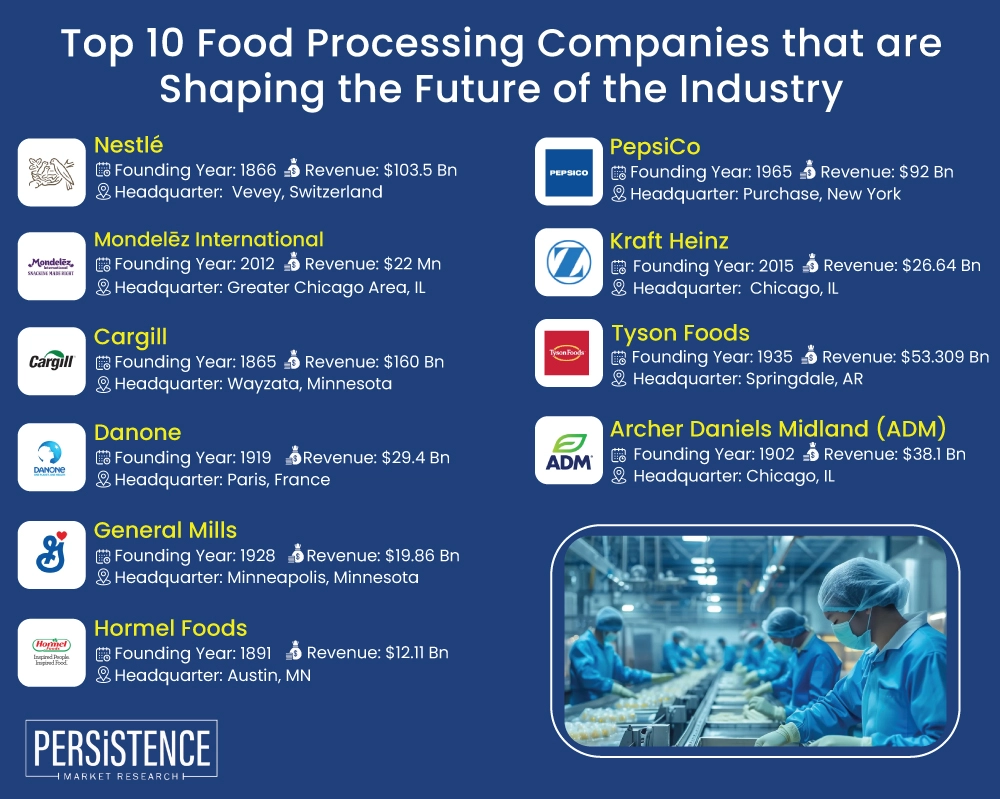- Blog
- Food Processing Companies
Top 10 Food Processing Companies Striving to Make an Impact
Published On : 27 Nov 2024
The food processing industry is a vital part of the global economy. As the demand for convenient, sustainable, and nutritious food options continues to rise, companies at the forefront of this industry play a key role in shaping food innovation. As consumers progressively adopt vegan and flexitarian diets, food processing companies are investing in plant-based products.
Increasing awareness of health has led food companies to focus on low-sugar and gluten-free food options to meet consumer demand for healthy foods. Rising demand for sustainable sourcing and eco-friendly packaging provides businesses with an opportunity to stand out in the competition and meet regulatory standards. Advancements in data and technology have raised personalized nutrition, thereby offering companies a chance to create customized food solutions for health-conscious consumers.

Top 10 Food Processing Companies that are Shaping the Future of the Industry
1. Nestlé
Nestlé, the world’s largest food and beverage company, continues to lead the global food processing equipment market. The company is widely known for its broad range of products including diary, beverages, and pet care. The brand has been actively investing in plant-based alternatives and sustainable souring practices.
In 2024, Nestlé announced a partnership with Oatly to extend its plant-based beverages line, thereby catering to the increasing demand for diary-free options. The growing trend of sustainability and health-conscious eating presents enormous opportunities for growth. The company’s efforts to diversify its portfolio through acquisitions like The Bountiful Company, focused on health and nutrition, highlights this shift.
2. PepsiCo
PepsiCo, a global leader in snacks and beverages, continues to drive growth through its diverse portfolio of products, including Pepsi, Quaker, Lay’s, and Tropicana. The company is shifting its focus on improving its offering with healthy and sustainable options.
In 2024, the firm launched a new line of plant-based snacks under Bare Snacks brand, thereby capitalizing on the plant-based proteins trend. Rising demand for organic products, plant-based beverages, and health snacks are emerging as the key growth areas for PepsiCo. The company is hence increasing its investments in sustainable agriculture.
3. Mondel?z International
Mondel?z International is a prominent global snacking company offering products like Ritz crackers, Cadbury chocolates, and Oreo cookies. Mondel?z has been adapting its portfolio to cater to the evolving consumer preferences with an emphasis on premium ingredients and health-conscious snacks.
In 2024, Mondel?z launched a line of better-for-you snack bars under the BelVita brands to cater to health conscious snackers. The company is also tapping in the health snack market and extending its gluten-free and plant-based snack offerings to appeal to a broad consumer base.
4. Kraft Heinz
Kraft Heinz is a packaged foods giant that has transformed its products offerings to include healthier and sustainable options, thereby reflecting consumer preference for better ingredients. In 2024, the company introduced its Heinz Plant-based line that offers meatless sauces and condiments to cater to the increasing vegetarian and vegan population. With increasing demand for healthy alternatives, Kraft Heinz is focusing on products that are lower in salt, sugar, and fats. It is also extensively utilizing natural ingredients to attract a large consumer base.
5. Cargill
Cargill is a global agricultural powerhouse that has extended its reach in food processing to succeed in various segments- right from meat and poultry to grain-based products and edible oils. The company is shaping the future of food with its strong commitment to sustainability and innovation.
The company, like others, is capitalizing on the rise of plant-based products along with sustainable food options. Its efforts to decrease greenhouse gas emissions and enhance supply chain transparency have positioned Cargill for potential success. It is committed to investing in regenerative agricultural practices through its partnership with Mooalition to create sustainable dairy alternatives.
6. Tyson Foods
Tyson Foods is a leader in meat and poultry processing industry that offers a variety of products including beef, chicken, and pork. The company is extending its product portfolio in plant-based and alternative products, thereby capitalizing on the shifting consumer preferences.
Tyson Foods introduced Tyson’s Raised & Rooted, a plant-based protein product line to cater to the booming plant-based products market. Rising demand for plant-based protein coupled with consumer concerns for animal welfare present significant opportunities for Tyson Foods to diversify its product portfolio.
7. Danone
Danone is a France-based multinational food company that is leading the dairy, plant-based food, medical nutrition, and water businesses. The firm has prioritized health and sustainability through the launch of novel plant-based innovations that align with global dietary shifts.
Danone, in 2024, launched a new line of plant-based yogurt and dairy-free products that are aimed at succeeding in the vegan and lactose-free market. Health-conscious consumers are focusing on gut health and plant-based alternatives, which presents significant opportunities for growth.
8. Archer Daniels Midland (ADM)
ADM is a prominent player in the global food processing industry that specializes in agricultural processing including corn, wheat, and soybeans. The business is specifically known for its sweeteners, oils, and food ingredients.
ADM is capitalizing on the rising demand for plant-based proteins, sustainable sourcing practices, and novel sweeteners. In 2024, the company announced the launch of ‘Plant-based Protein Innovation Center’ to accelerate its research and development in plant-based food products.
9. General Mills
General Mills, widely popular for its iconic brands like Betty Crocker, Cheerios, and Haagen-Dazs is embracing innovation through its focus on healthy and organic food options. The company is consistently updating its product portfolio to reflect the rising preference for plant-based and sustainably sourced products.
In 2024, General Mills launched the Better-for-You snack lines under its brand Annie’s featuring organic and clean-label products. Increasing consumer demand for organic and better-for-you food options has led the company to invest in new product development and sustainable initiatives.
10. Hormel Foods
Hormel Foods is widely known for its frozen foods, processed meats, and deli items. It also has been a strong advocate for plant-based and protein alternatives. The brand is focused on offering superior-quality and innovative products that cater to the needs of today’s health-conscious consumers.
Homel Foods recently launched Happy Little Plants, a plant-based protein brand catering to consumers looking for meat alternative snacks. The company’s expansion into plant-based meat alternatives coupled with sustainable practices is opening new revenue streams.
Companies Comply with Strict Food Safety Standards with Clean Label Trends
Around 75% of consumers globally are willing to pay more for products with transparent labelling and natural ingredients. They are prioritizing easily recognizable and fewer ingredients in their products. Ingredients like ancient grains, botanicals, and natural sweeteners are leading the clean-label movement, thereby aligning with consumer preferences for health and authenticity.
Countries across the globe are increasing their food safety regulations and are hence significantly spending on food safety technology. The Food Safety Modernization Act (FSMA) in the U.S. continues to influence the global food practices. Nearly 87% of consumers view food safety as a key factor while choosing products, thereby demanding enhanced traceability and hygiene in food processing.
Leading companies in the food processing industry are investing in automation and AI to ensure compliance with food safety standards and traceability. They are also adopting blockchain-enabled supply chains as these assist in decreasing recall times by 90%, thereby safeguarding consumer trust.
Industry Report

Request Report Sample
Your privacy is important to us; your data is secure
Contact Us
Latest Reports
-
Floriculture Market by Product Type (Cut Flowers, Potted Plants, Bedding Plants), Flower Type (Roses, Lilies, Others), Floral Fashion Type (Fresh Accessories, Live Appliqué, Botanical Jewelry), Application (Decorative, Industrial, Others), and Regional Analysis 2026 - 2033
-
Exterior Silicone Caulk Market by Product Type (Neutral cure silicone caulk, Acid cure silicone caulk), End-user (Building Envelopes, Curtain Walls, Windows and Doors, Siding and Cladding Companies), and Regional Analysis for 2026 - 2033
-
Entertainment and Amusement Market by Product Type (Theme Park, Festivals and Concerts, Entertainment Sports, Live Events, Arcades, Cinemas), Age Group (Children, Teenagers, Young Adults, Adults, Seniors), and Regional Analysis for 2026 - 2033
-
Air-Operated Double Diaphragm Pump Market by Material Type (Polypropylene (PP), PolyVinylidene Fluoride (PVDF), Stainless Steel (SS), Aluminum), Max Flow Rate (<100 LPM, 100-300 LPM, 300-500 LPM, 500-700 LPM, >700 LPM), Industry (Paints and Coatings, Food and Beverages, Pharmaceutical, Electronics, Wastewater Treatment, Oil & Gas, Other), and Regional Analysis for 2026 - 2033
-
Electropolishing Services Market by Product Type (Citric Acid, Nitric Acid, Sulfuric Acid, Hydrochloric Acid, Phosphoric Acid), Application (Medical and Pharmaceutical Industry, Aerospace and Defense, Others), and Regional Analysis for 2026 - 2033
